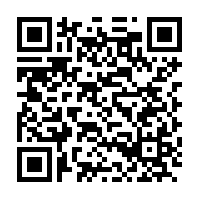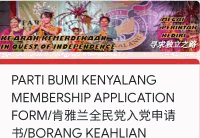
In a recent commentary, Voon Lee Shan, President of Parti Bumi Kenyalang, addressed remarks made by the Speaker of Sarawak's Assembly regarding the Malaysia Agreement 1963 (MA63). The Speaker claimed that Sarawak signed the agreement as a nation, asserting its status as a defined territory with a government and permanent population.
However, Voon challenges this assertion, arguing that Sarawak did not enter the agreement as an independent nation but rather as a British colony still under UK control at the time of signing.Voon elaborates on the distinction between a "nation" and a "country," emphasizing that while Sarawak may have had national characteristics, it lacked the independence necessary for statehood.
He cites definitions from international law, including the Montevideo Convention, which outlines the criteria for statehood, highlighting that Sarawak did not meet these requirements when the agreement was signed on July 9, 1963.
Furthermore, Voon references historical accounts and legal opinions indicating that Sarawak remained under British authority until September 16, 1963, when Malaysia officially came into being. He argues that without independence from colonial rule, Sarawak could not legally sign the MA63. Voon concludes by stating that the agreement.
Full text of the Parti Bumi Kenyalang President Voon Lee Shan statement as follows:
Shalom to fellow citizens of Sarawak and Borneo People,
I beg to make some comments concerning a video released by the learned Speaker, Tan Sri Mohd Asfia Awang Nassar, concerning the signing of an agreement, in which, I think, he was referring to the Malaysia Agreement 1963(MA63) in which the learned Speaker said, “When you signed an agreement, you do not sign as a colony, you signed as a nation.”
The learned Speaker also went to say from 22 July to 16 September, 1963 Sarawak was a nation. He said Sarawak is a nation with a defined territory, with a land mass, a government, permanent population, not migratory, there was an institution of Head of State and a system of law – in short Sarawakians are a definite people.
The learned Speaker said Sarawak entered into the Malaysia Agreement as a nation. I wish not to dispute that, but, Sarawak did not enter the Malaysia Agreement as an independent nation.
May I digress a bit about what is meant a Nation or Country. It has always confused most of us.
A nation is a large group of people with similar characteristics and culture. A country is a geographic region that has boundaries and borders. The important thing to remember is that a country has its own national government while a nation has its own national character.
I beg to say that what the learned Speaker meant was that Sarawak entered the Agreement as a country or as a State.
I beg to say that Sarawak had not at that material time attained statehood because, Sarawak was never granted independence by the United Kingdom until now. Sarawak was very much still under the control of the British at that time. “Statehood” according the Oxford Dictionary means, “the status of being a recognized independent nation”. The key word is “independent”. That means, a country could not attain “statehood” unless the government of the country is independent and not under the control of another.
What I respectfully wish to say is that at the time the Malaysia Agreement was signed on 9 July, 1963 Sarawak was still a country controlled or colonized by the United Kingdom. Sarawak was not independent at that time.
I also need to stress that Sarawak was never granted independence by the United Kingdom at the time the Malaysia Agreement was signed on 9 July, 1963.
Later, a political event happened on 22 July, 1963 which is claimed by many people, including activists and politicians, that, Sarawak on that day gained independence or was granted self-rule or self-governance when Dato Stephen Kalong Ningkan, was on that day, appointed by the British governor as the Chief Minister of Sarawak.
There was no legal instrument granted by the United Kingdom to allow Sarawak independence, self-rule or self-government. According to Professor Michael Leigh in his book, DEALS, DATUS AND DAYAKS at page 61, ..the British Governor at that time remained in absolute control through until 31 August 1963. The key words Prof Michael Leigh used was, “absolute control”.
Prof.Michael went on to say in page 62 of his said book, that, The governor continued to prudently exercise authority on what had been agreed by the ICG to be federal matters until Malaysia came into being on 16 September. It was the date that the Union Jack no longer flew over the Astana, Datu Abang Openg was sworn in as state governor, and Malaysia came into being.
This clearly shows that the British was in Sarawak and in full control of Sarawak until 16 September, 1963.
For a British colony to be decolonized or to be granted independence, we need to refer to a Telegram from Lord Selkirk to Colonial Office, forwarding a message from Sandys, 1st September, 1963 which mentioned that:
(a) That a grant of independence to a territory under British sovereignty requires an act of Parliament at Westminister.
(b) That the British Malaysia Act (which comes into force on 16 September) provides for the transfer of British sovereignty over Singapore, Sabah and Sarawak to the new Federation of Malaysia but does not provide for the separate independence of these territories.
Therefore, at the expense of repetition, Sarawak did not achieve statehood on 22 July 1963.
If Sarawak was independent, there was no need for the United Kingdom to initiate the Malaysia Agreement 1963 to transfer sovereignty to Malaya - Sarawak would independently decide to or not to become a member of the Malayan Federation.
I also beg to refer to the definition of what is meant as a sovereign State in international law. “Sovereign State” is defined as having a permanent population, defined territory, a government not under another, and the capacity to interact with other states.
The 1933 Montevideo Convention describes a state in Article 1 as:
1. Having a permanent population
2. Having a defined territory
3. Having a government
4. Having the ability to enter into relations with other states
Therefore, from the points of international law, the argument or opinion of the learned Speaker flawed when he said Sarawak could on 9 July,1963 signed the Malaysia Agreement. I respectfully beg that, the learned Speaker’s opinion flawed because under international law, a country or a nation must have the capacity to interact with other States of the world. The State or country must not be a government not under another. This was confirmed by the legal opinion of the International Court of Justice (ICJ) in the Chagos Islands Case delivered in February, 2019.
If a country has no legal capacity to enter any relations with other States of the world, how could Sarawak, while still being a colony or under the control of the United Kingdom, was able or have the legal capacity to sign the Malaysia Agreement 1963 on 9 July 1963?
The United Kingdom transfer of Sarawak sovereignty under the Malaysia Agreement 1963 was signed by PEH Pike, the colonial Attorney-General of Sarawak. This confirmed what the Attorney-General himself stated that neither Sarawak or North Borneo was sovereign and therefore could not be included as signatories to MA63.
PEH Pike wrote that:
Sarawak and North Borneo are not parties to the formal agreement and the undertakings etc. would be given to Britain rather than Sarawak and North Borneo. Logically and legally therefore it would be right to exclude them from the formal agreement but from a presentational point of view I think it is important…see Sarawak Attorney-General, 6 June 1963, UK National Achives, Foreign and Colonial Office (FCO) 141/12937(21) Richmond, Surrey.
Therefore, legal opinions of international law lawyers and foreign law professors whom I had the privilege to consult or speak to opined that the Malaysia Agreement 1963 was null and void ab intio. Even if the Malaysia Agreement 1963 been entered into in compliance with international law, it is invalid, because of too many fundamental breaches of the terms and conditions in the Agreement.
The Agreement also collapsed after the Singapore left or no more part of the federation of Malaysia in 1965.
I was advised that the impact of a null and void international agreement is that Malaysia was not formed in compliance with international law and Malaysia could be dissolved or could disintegrate. If the agreement had too many fundamental breaches, this could also be good grounds for Sabah and Sarawak to seek independence from the federation of Malaysia peacefully and through legal channels. The right to seek exit was from mouth of Lord Lansdowne, the Chairman of the Inter-governmental Committee (ICG).
I beg fellow Sarawakians and people of Borneo know how Malaysia Agreement 1963 was formed and how Sarawak and Sabah are now part of the federation of Malaysia or be part of Malaya. I beg that I need to correct the flaws of the opinions of the learned Speaker, Tan Sri Asfia Awang Nassar because it is the Truth that sets us free.
VOON LEE SHAN
PRESIDENT,
PARTI BUMI KENYALANG
19 SEPTEMBER 2024
#Sarawak #Tribune #Sabah #PBK #Independence #MA63 #PDA74 #TSA2012 #Oil #Gas #Dayak #News #Borneo_Post #New_Straits_Time #Sin_Chew #See_Hua #X #Instagram #facebook #google #wechat #whatsapp #tiktok









